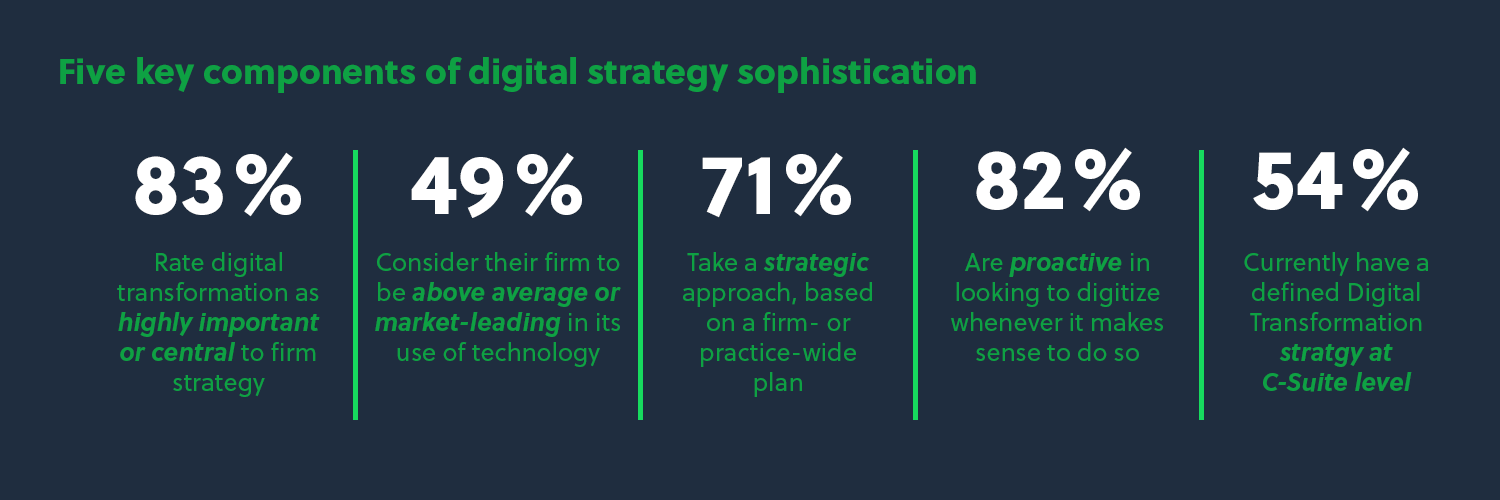In recent years, there has been a definitive shift within the Legal sector: a shift to digital transformation…
In the article below, we discuss the rapid onset of digital transformation projects within the legal market, as well as the challenges and opportunities this presents firms with going forward.
The onset of digital transformation, for many firms, has been in the pipeline for some time. However, while many firms in the legal sector were already beginning to embrace digital, the impact of the pandemic played a large role in the rapid adoption of digital strategies. When remote working was enforced, all businesses had to accelerate their existing plans and make digital transformation their top priority to ensure continuity. Now, with the pandemic fortunately in our rearview mirror, digital processes are firmly on the legal map.
With firms increasingly reaping the benefits of adopting LegalTech, more and more are now seeking to enhance their offering by putting new tech-focused initiatives in place. In a survey conducted by Thomson Reuters in June 2023, 83% of legal firms surveyed rate their digital transformation ambitions as ‘highly important or central to firm strategy’, while 82% also define themselves as ‘proactive in looking to digitize wherever it makes sense to do so.’ This presents a clear mindset change within the industry when compared to 5 or so years ago.

In the same survey, Reuters found that firms ranked engagement and buy-in, improved infrastructure, efficiency, reduced cost, client service, and being a market leader as some of the biggest wins over the course of their digital transformation journeys. New tech and digital process adoption has played a huge role in improving overall efficiency for law firms, which are now able to automate many of the time-consuming manual tasks, freeing legal professionals up to spend more time on the more nuanced, intricate, and complex work that requires the human touch. Many firms have also mentioned that going paperless and moving to cloud-based storage systems for all of their documentation has been a huge benefit, not only for ease of access and collaboration but also for security and confidentiality. This is generally the case for all law firms and practices; however, it is particularly prevalent within conveyancing: pre-pandemic, the majority of the conveyancing firms we worked with were paper-based, which meant that every case would have a physical file with the relevant documentation to the move. So you could be looking at one singular lawyer at some of these firms having 100 physical paper case files at any one time. Not only is this challenging on a practical level, but it also makes it difficult to collaborate and work efficiently. There has been a massive shift over the last 3 years within conveyancing specifically, where case management has gone digital. The law firms that have done far better with regard to hybrid working are the ones who have made these changes and adopted digital processes.
 All of this together ensures a better experience for the firm’s clients and ensures they are standing out from the crowd as a market leader in the legal space. Embracing emerging tech has undoubtedly given some firms an edge over their competitors, and those who have been able to garner engagement and retain an open-minded approach in their digital strategizing have undoubtedly set themselves apart. But, with all of this being said, there are undeniably still hurdles to be overcome, and some firms have had more success than others in embracing the onset of digital transformation. Of those law firms surveyed by Reuters, 28% ranked the biggest challenge around digital strategy to be resources (time, money, and people); this was the second-highest stumbling block behind getting engagement and buy-in at the initial stages.
All of this together ensures a better experience for the firm’s clients and ensures they are standing out from the crowd as a market leader in the legal space. Embracing emerging tech has undoubtedly given some firms an edge over their competitors, and those who have been able to garner engagement and retain an open-minded approach in their digital strategizing have undoubtedly set themselves apart. But, with all of this being said, there are undeniably still hurdles to be overcome, and some firms have had more success than others in embracing the onset of digital transformation. Of those law firms surveyed by Reuters, 28% ranked the biggest challenge around digital strategy to be resources (time, money, and people); this was the second-highest stumbling block behind getting engagement and buy-in at the initial stages.
Undergoing a digital transformation project is often a complicated and somewhat challenging process. Law firms will require the right staff to be in place to ensure successful adoption, as well as to provide the ability to continue scaling and embracing the right technology as and when required. Our business has divisions within both Legal and Digital & Tech, so we are fortunate to be well placed and well qualified to advise Legal firms on the market trends and opportunities within both markets. And, from our own experience operating in both of these niches, it is clear that the need for qualified and experienced staff is being felt tangibly within the recruiting and staffing sphere: Heat has been operating within the legal recruitment industry for over 10 years now, but we have never seen such an unprecedented rise in the demand for tech talent within the legal sector.
Ultimately, the shift to embracing digital within the legal sphere provides a plethora of new opportunities; for the firms themselves, as well as for the wider market and economy. Adapting to change is creating a wealth of new positions and opportunities for collaborations across different markets and verticals and, as firms continue to adapt, they continue to strengthen their offering and redefine what it means to be a market-leading law firm.
The digital shift is inevitable, but it is up to individual law firms to decide whether they are going to embrace the opportunity to become change-makers and digital pioneers within their spheres, or whether they will be left behind by their competitors: the choice is theirs.